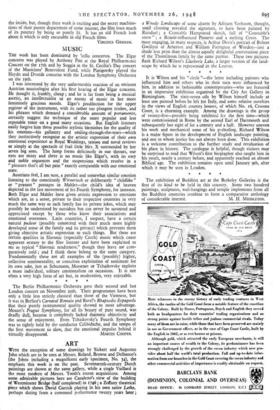MUSIC
THE week has been dominated by 'cello concertos. The Elgar concerto was played by Anthony Pini at the Royal Philharmonic Concert on the 17th and by Suggia at the St. Cecilia's Day concert of the Musicians' Benevolent Fund, while Piatigorsky played the Haydn and Dvorak concerto with the London Symphony Orchestra on the 19th.
I was interested by the very unfavourable reaction of an eminent Austrian musicologist after his first hearing of the Elgar concerto. He thought it, frankly, cheap ; and he is far from being a musical ascetic, an intellectualist or an enemy of music in her more femininely gracious moods. Elgar's predilection for the upper register of the instrument with its rather too plangent timbre, and his phrases which demand a considerable amount of portamento, certainly suggest the technique of the more popular and less reputable tenor on a good many occasions. But English listeners easily forgive him these possible stylistic blemishes for the quality of his emotion—his gallantry and smiling-through-the-tears—which they instinctively recognise as the artistic expression of their own emotional experience at Royal Weddings, tattoos and naval reviews or simply at the spectacle of frail little Mrs. X surrounded by her seven big sons. The lump forms deliciously in our throats, our eyes are misty and there is no music like Elgar's, with its easy and noble sequences and the suspensions which resolve in a "pleasure that's all but pain" exactly comparable with our emotional state.
Austrians feel, I am sure, a parallel and somewhat similar emotion listening to the consciously Wiener isch or deliberately " childlike " or " peasant " passages in Mahler—the child's idea of heaven depicted in the last movement of his Fourth Symphony, for instance. Both Elgar and Mahler have given artistic expression to emotions which are, in a sense, private to their respective countries in very much the same way as each family has its private jokes, which may possibly be understood by outsiders but can never be savoured and appreciated except by those who know their associations and emotional overtones. Latin countries, I suspect, have a certain natural pi/deur (possibly connected with their much more highly developed sense of the family and its privacy) which prevents them giving objective artistic expression to such things. But there are certain qualities in Slavonic (especially Czech) music which cause apparent ecstasy to the Slav listener and have been explained to me as typical "Slavonic tenderness," though they leave me com- paratively cold ; and I think these belong to the same category. Fundamentally these are all examples of the (possibly) higher, collective sentimentality, or conscious exploitation of sentiment for its own sake, just as Schumann, Massenet or Tchaikovsky exploits a more individual, solitary emotionalism on occasions. It is not often a very high form of art but, in moderation, very enjoyable.
* * * *
The Berlin Philharmonic Orchestra gave their second and last London concert on November 20th. Their programmes have been only a little less strictly classical than those of the Viennese, but it was in Berlioz's Carnavai Roman and Ravers Rhapsodie Espagnole that their purely instrumental quality showed to most advantage. Mozart's Prague Symphony, for all its beauty of pure sound, was deadly dull, because it completely lacked diamatic objectivity and the sense of enjoyment. Even Tchaikovsky's Fourth Symphony was so tightly held by the conductor Celibidache, and the tempo of the first movement so slow, that the emotional impulse behind it




































 Previous page
Previous page